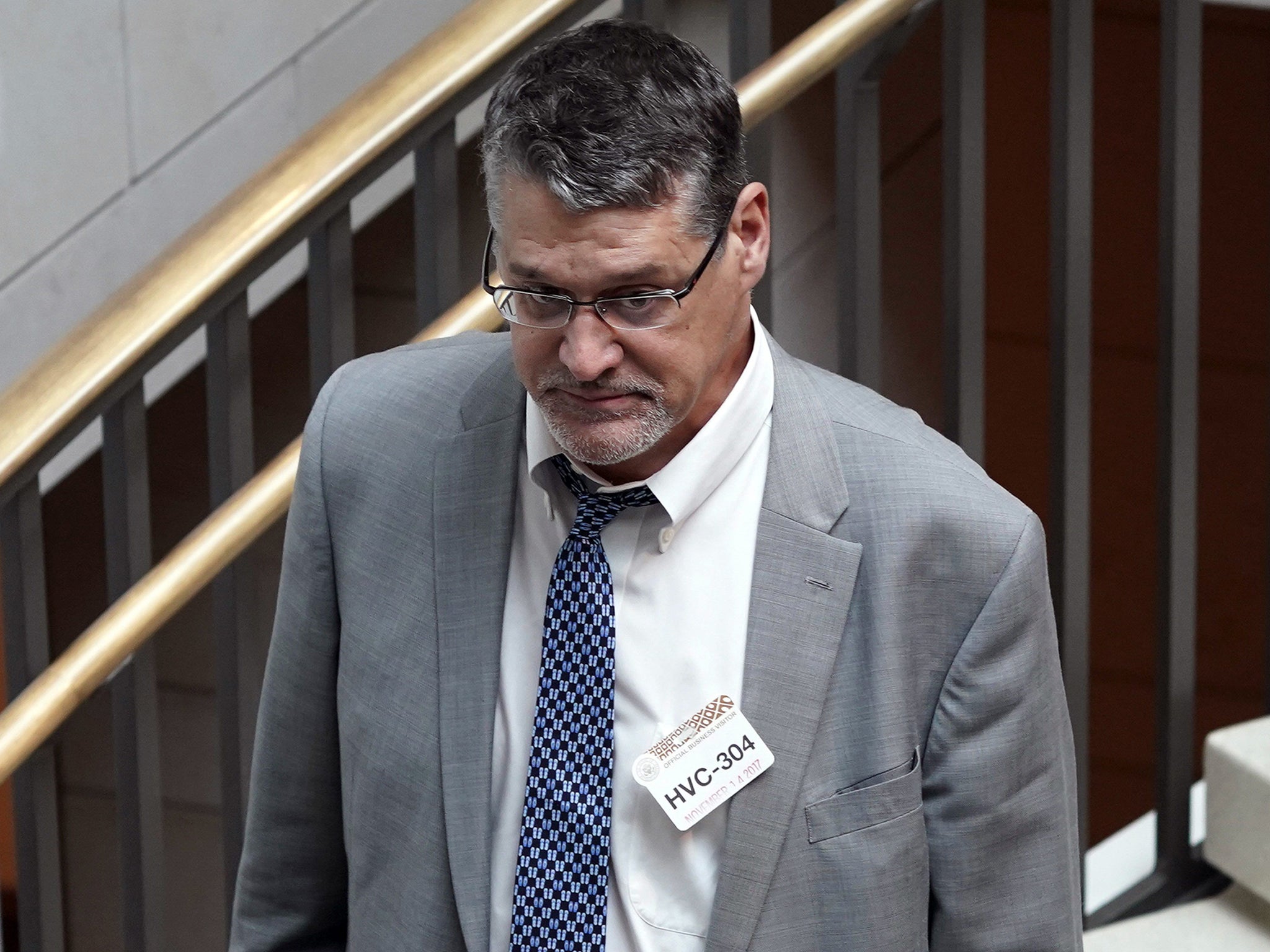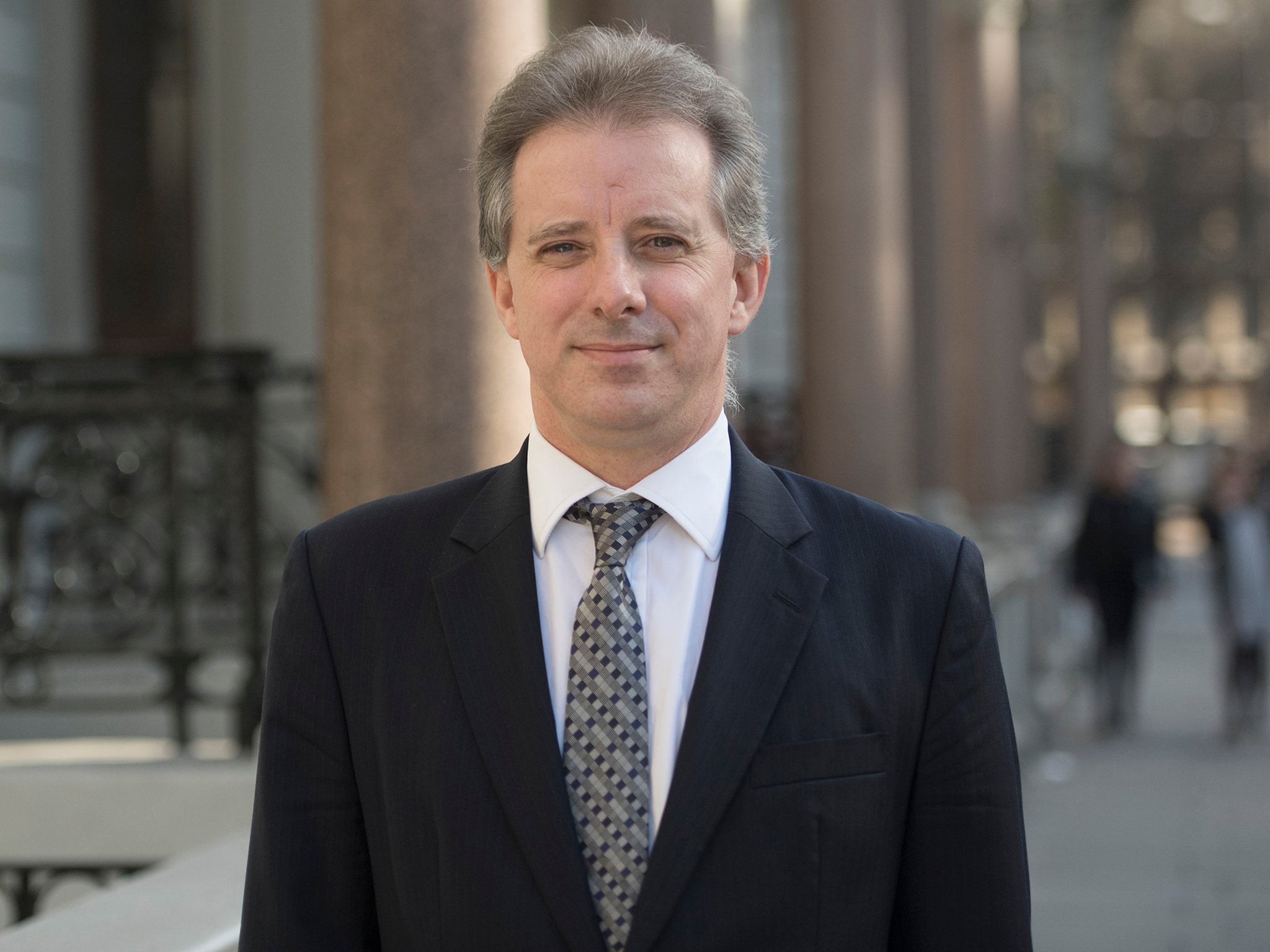Glenn R Simpson: Fusion GPS founder behind Trump-Russia dossier returns to the spotlight
This isn’t the first time the journalist-turned-researcher has been on the front line of a political scandal, but is it the biggest story of his career? Matt Flegenheimer goes back to where it all began

Your support helps us to tell the story
From reproductive rights to climate change to Big Tech, The Independent is on the ground when the story is developing. Whether it's investigating the financials of Elon Musk's pro-Trump PAC or producing our latest documentary, 'The A Word', which shines a light on the American women fighting for reproductive rights, we know how important it is to parse out the facts from the messaging.
At such a critical moment in US history, we need reporters on the ground. Your donation allows us to keep sending journalists to speak to both sides of the story.
The Independent is trusted by Americans across the entire political spectrum. And unlike many other quality news outlets, we choose not to lock Americans out of our reporting and analysis with paywalls. We believe quality journalism should be available to everyone, paid for by those who can afford it.
Your support makes all the difference.From the start, he was a central casting misfire – the dark artist slicing through the capital by electric scooter, a cloak-and-dagger digger better known to former colleagues for scratching his bare belly in plain office view.
In a past career, Glenn R Simpson had been a reporter’s reporter, tenacious through two decades in journalism, often driving the Washington story of the day – congressional corruption, fundraising shenanigans, sundry misbehaviour – but never becoming it himself.
Simpson’s life has not been boring for some time now. It has, perhaps inevitably, become news.
As investigators circle President Donald Trump’s administration over ties to Russia during the 2016 campaign, Simpson, a 53-year-old Wall Street Journal veteran-turned-master of high-dollar research, has arrived at the biggest story of either of his careers, lurching to the centre of the Russia-tinged scandal that clouds the presidency.
Trump knows his work intimately. Simpson is the man behind an explosive dossier – produced at his firm, Fusion GPS, with a former British spy, Christopher Steele – outlining possible connections between the President, his associates and Russian officials.
For months, Simpson’s name has ricocheted across the halls of Congress and the airwaves of Fox News, becoming shorthand in conservative circles for purported investigatory overreach and counter-conspiracies against the White House. Questions about his research have become central to Republican attempts to discredit not just Fusion but the very existence of inquiries into Trump, including the efforts of the special counsel, Robert Mueller. Republican leaders of the Senate Judiciary Committee have asked the Justice Department to investigate whether Steele, whom Simpson hired, lied to federal authorities about his contacts with journalists.

Simpson himself has been hauled before three congressional committees for some 20 hours of questions and answers. “Uncooperative,” Senator Charles E Grassley, from Iowa, says of Simpson’s turn before the Judiciary Committee, which he leads.
“Very cooperative,” says Representative Adam B Schiff of California, the top Democrat on the House Intelligence Committee, where Simpson also appeared.
Simpson can be both of these things – according to interviews with dozens of friends, colleagues and investigative targets – and a few more: brash, obsessive, occasionally paranoid, perhaps with cause.
The name of the firm, founded in 2010, was intended to represent a “fusion” of journalism and business intelligence. The “GPS” hinted aspirationally at a global reach. In practice, Fusion’s task has often translated, roughly, to finding out unsavoury things about unsavoury people, at the behest of not-especially-savoury clients.
More notable to some lawmakers is Simpson’s connection to two figures with deep bonds to Russian power, who have long fought for a pet Kremlin cause: Rinat Akhmetshin, a Russian-American lobbyist, and Natalia V Veselnitskaya, a lawyer known as a formidable Moscow insider.
The two have worked to turn back the Magnitsky Act, a 2012 US law detested by President Putin of Russia, that punishes Russian human rights violators. And together with Simpson, the trio worked on behalf of a Russian-owned company accused by the US government of laundering some of the funds stolen in a fraud uncovered by Sergei L Magnitsky, after whom the act was named.
We collect facts. Occasionally, they turn out to be helpful to people we deplore, like Vladimir Putin, or undermine people for whom we have sympathy, like William Browder
Simpson had been hired by a law firm, BakerHostetler, representing the company. As part of this work, he compiled damaging allegations against William F Browder, a US-born financier and Kremlin foe who was the driving force behind the Magnitsky Act.
“He’s a professional smear campaigner and liar for money,” Browder says of Simpson. “The credibility of anything that he does is in question.”
The Magnitsky Act was a topic of discussion at an infamous meeting that both Veselnitskaya and Akhmetshin attended at Trump Tower in June 2016 with Donald Trump Jr, who had been promised compromising information on Hillary Clinton. Simpson was in court with Veselnitskaya hours before the Trump Tower meeting and saw her again shortly after it, his lawyer, Joshua A Levy, confirmed. But these contacts were related to Simpson’s work on the case for BakerHostetler, Levy says, and Fusion only learned about the Trump Tower meeting in news reports last year.
“We collect facts,” Fusion said in a statement, describing itself as a research company. “Occasionally, the facts turn out to be helpful to people we deplore, like Vladimir Putin, or undermine people for whom we have considerable sympathy, like William Browder.”
For his efforts, Simpson has been presented with a defamation lawsuit and a congressional subpoena demanding bank records, which the firm is fighting in court, saying it could jeopardise a confidential client list.
But Fusion continues to look into ties between Trump and Russia, according to several people briefed on the research.
The spy and the scribe
Since shortly after Trump’s candidacy began, Fusion had been researching his past scandals and possible vulnerabilities. The firm was paid initially by a conservative website, The Washington Free Beacon, financed largely by Paul Singer, a top Republican donor who had opposed Trump.
As Trump emerged as the presumptive Republican presidential nominee, Democrats began picking up the tab. A law firm, Perkins Coie, hired Fusion to gather information about Trump on several fronts, including possible ties to Russia, on behalf of Clinton’s campaign and the Democratic National Committee.
Soon, a new urgency set in. By June, there were reports that the committee had been hacked, apparently by Russian agents. Simpson connected with Steele, whom he had met in 2009. As a former spy inside Russia, Steele was ill-positioned to travel there himself. He hired native speakers to call informants inside the country and communicated discreetly with his own connections.

His findings – more a series of memos than a single narrative arc – outlined a year-long effort to influence Trump, perhaps initially because he had intersected with Russian oligarchs whom Putin hoped to track. The dossier’s most memorable entry is an unsubstantiated account involving Trump, Russian prostitutes and a defiled Moscow hotel bed where the Obamas once slept.
The research also described a series of contacts between Trump associates and Russians during the campaign, in part to discuss the hacking of the Democratic National Committee and John Podesta, Clinton’s campaign chairman. In time, Steele shared some of his information with the FBI.
“He felt he was witnessing a national security crime in progress,” says Simpson, who declined to be interviewed for this article but addressed some questions via email. “I did not object, and did not ask for permission from our clients. Chris was the national security professional, so I deferred to him.”
Though Trump and his allies have suggested that the dossier alone prompted the FBI’s investigation into whether his campaign colluded with the Russians, current and former US and foreign officials have said otherwise. The primary impetus came, instead, with the revelation that a Trump foreign policy adviser told an Australian diplomat that Russia had political dirt on Clinton, coupled with the release of the hacked Democratic National Committee emails.
A tumultuous life
In his early twenties, as a student at George Washington University, Simpson broke his neck in a car crash. In his late 30s, he turned back spinal cancer. In between, Simpson produced some of Washington’s most important journalism, writing stories on the Keating Five savings and loan scandal and the assorted misadventures of Newt Gingrich, then the House Speaker.
“He had a very strong sort of ethical backbone,” says Jim Glassman, former editor-in-chief of Roll Call, Simpson’s professional home before he joined The Journal.
In 2009, Simpson announced he was leaving the profession to start SNS Global, a research company that predated Fusion. Few Washington industries traffic in sainthood. Many are mercenary in nature. And Fusion seems to be of a piece, hustling for its cut.
He’s a professional smear campaigner and liar for money. The credibility of anything he does is in question
The firm says it has “worked for both Republicans and Democrats in a handful of elections”.
Steele has reportedly appraised the memos as 70 to 90 per cent accurate, an estimate that Simpson is said to embrace himself. But Simpson has bristled at suggestions that the dossier is some kind of liberal fever dream. Its broad conclusions – once outlandish themselves – have already proved prescient, the firm has argued.
“More than a year has gone by since these memos were produced,” Simpson says. “I have not become aware of any disinformation.”
David Enrich contributed reporting from New York. Kitty Bennett contributed research.
© The New York Times
Join our commenting forum
Join thought-provoking conversations, follow other Independent readers and see their replies
Comments